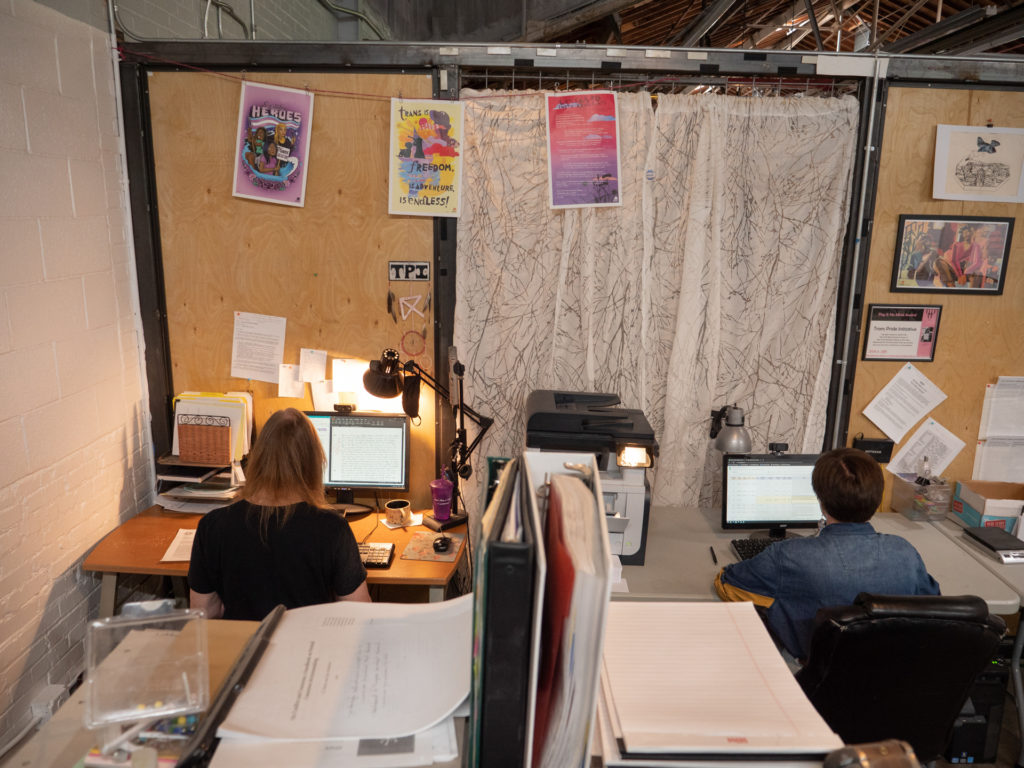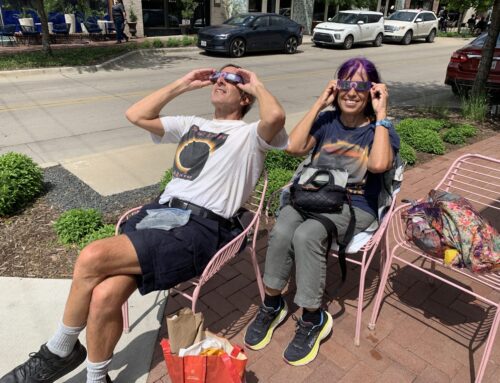Trans Pride Initiative started 11 years ago to focus on supporting people who are transgender and gender-diverse, focused on homeless shelters and health care access.
The nonprofit, founded by Nell Gaither, received its first letter from a prisoner in 2013. The following year, a Texas prisoner wrote to say they wanted to start hormones.
Gaither reached out to several LGBTQ organizations, and no one wanted to get involved. One specifically said they wouldn’t help any trans person access trans health care in prison.
“That made me mad,” Gaither says.
So she wrote the person back herself and said, “let’s see what we can do.”
Four months later, the letter-writer started hormones. It’s hard to tell for sure because data is scarce, but Gaither thinks that could be the first case of a person starting hormones in a Texas prison who wasn’t on them when they entered.
Word began to spread, and prison letter-writing soon became the focus of Trans Pride Initiative, “because really nobody else is doing this work.”
The nonprofit often receives letters from people whose safety is at risk.
Many of them want “safekeeping,” a prison housing designation for people who are vulnerable to sexual abuse and other forms of violence. Attaining that status can be difficult, especially if the person has any history of violence themselves.
This isn’t a pen-pal organization.
“Some people just want someone to vent to, and some people are really looking to build a relationship with someone, and they don’t end up sticking with us too long because we just can’t provide that,” Gaither says.
Trans Pride Initiative is also working on Project 103, named after Texas family code 45.103, which deals with name changes.
People with felony convictions in Texas cannot legally change their names until two years after their sentences have ended. That means a person could access hormones and transition in prison, but they’re unable to change their name until long after their release.
“We’re very disproportionately affected by the prison system,” Gaither says. “And the prison system is not set up to help people succeed once they get out.”
The National Center for Transgender Equity estimates that one in six transgender people has been incarcerated, compared to a rate of one in 20 people in the overall population. For Black trans women, the estimate is very high, almost 50%.
Harassment or lack of encouragement from teachers means trans and queer people can be less successful in school, Gaither says.
“As a person who’s different, you’re told you don’t have any opportunities in employment, and you should just give up, and so you go to the street economy, and the street economy results in interactions with law enforcement,” she says.
Gaither, 61, is retired from the Dallas Public Library. She doesn’t take a salary from Trans Pride Initiative, and she keeps costs as low as possible, renting a space at Tyler Station and spending a few thousand dollars a year on letter-writing.
Trans Pride Initiative is run entirely by volunteers
To me this kind of work should be volunteer. And I know there’s people who disagree with that, but I think you lose some of your grassroots and community-mobilization characteristics if you start paying staff. Because then nobody wants to do the work unless they’re being paid, and you become more driven by fundraising than doing the work.
Volunteers can sign up online
It’s easy to join us. Our meetings are twice a month, and we talk about how to write letters and answer questions about different things people are experiencing in the letters. We deal with a lot of violence in the system.
More volunteers could activate more services
If we had more involvement, we could start up more things like health care access and houseless services and things like that. We have inactive committees for education and movement-building. So if somebody has something they want to do, they’re welcome to look at our member guide, and they can suggest something. So long as it fits in with our work, we would consider it.
The nonprofit is not seeking funding currently
We have support from foundations and an individual, so that has given us a nice working fund. Right now, we’re not even really seeking funds because I don’t think it’s fair to take money that other groups could use if there’s no immediate need.
How prison abolition and trans rights are related
Sometimes I feel like we got off our mission, but we are sticking to it in that a lot of what we deal with has to do with housing and anti-violence and health care access. We just didn’t initially recognize that as being a prison issue as well as a free-world issue.
The thing people don’t understand about Trans Pride Initiative
Prison abolition is the main thing that people don’t understand. And what you can say about that is limited because it’s a long conversation, and it takes work to understand.
Trying to explain it anyway
People think prison abolition is just destroying things, when actually, it focuses on building new systems that have more healthy ways of dealing with social harm. What we currently do is, we farm out dealing with social harm to dedicated groups like judges, prosecutors, the police and the prison system. But when you do that, you take away all the conditions that create the situation for social harm, and all you deal with is an instant. You don’t deal with the history that leads up to something. Prison abolition and transformative justice looks at how do we build community-based systems that are flexible and deal with harm that accrues generationally over time rather than a specific incident.







